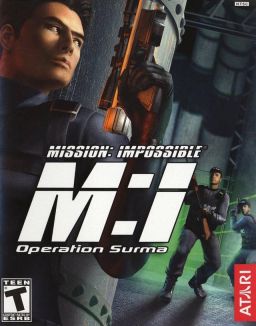Mission: Impossible – Operation Surma
This article needs additional citations for verification. (December 2008) |
| Mission: Impossible - Operation Surma | |
|---|---|
 | |
| Developer(s) | Paradigm Entertainment |
| Publisher(s) | Atari |
| Designer(s) | Craig Bolin |
| Composer(s) | Robert Daspit |
| Platform(s) | Xbox PlayStation 2 GameCube Game Boy Advance |
| Release | December 2, 2003
|
| Genre(s) | Action, stealth, third-person shooter |
| Mode(s) | Single-player |
Mission: Impossible – Operation Surma is a video game for the Xbox, PlayStation 2, and Nintendo GameCube consoles and also the Game Boy Advance. The game was released in 2003. The third-person action game was published by Atari and developed by Paradigm Entertainment.
Plot
Ethan Hunt and the Impossible Mission Force (IMF) are brought into an investigation of a shady international corporation, known as SURMA, that is in possession of a highly advanced computer virus known as Ice Worm. It has the power to break through any type of security system and could lead to the theft of any data ranging from nuclear weapons specs to intelligence of any government. When their own operations are sabotaged, Ethan and the IMF team find out that their secure databases have been hacked and that their enemies are now in possession of some of their deepest, darkest secrets. The team must find this worm to protect global internet security.
Voice cast
Tom Cruise, who plays Ethan Hunt in the Mission: Impossible films, does not lend his likeness or voice to the character in the game. Veteran voice actor Steve Blum replaces him. Ving Rhames and John Polson reprise their roles of Luther Stickell and Billy Baird from Mission: Impossible II.
- Steve Blum as Ethan Hunt
- Ving Rhames as Luther Stickell
- John Polson as Billy Baird
- Melinda Clarke as Sofia Ivanescu
- Kirk Thornton as Simon Algo / George Spelvin
- Mona Marshall as Jasmine Curry
- Steve Bulen as Director Swanbeck / Vasyl Berkut
- Rob Monroe as Additional Voices
Reception
Reviewing the console versions, IGN rated the game 7.3 out of 10, writing: "[Mission: Impossible – Operation Surma] comes off just slightly north of decent. It streamlines a lot of the controls and functions that may have intimidated gamers who stumbled through Splinter Cell or Metal Gear Solid 2. ... [It features] too much handholding for our tastes, but casual gamers may take to the gadget-heavy and linear gameplay. The intuitive inventory system works well."[1] GameSpot, giving the game an identical score, wrote: "[It] takes no big chances with the stealth genre's rules, but it's a well-made and entertaining game all the same. ... If you've played and enjoyed games like Splinter Cell and find yourself hungering for more, you'll find exactly what you're looking for with Operation Surma."[2]
Reviewing the Game Boy Advance version, IGN rated the game 3.5 out of 10, writing: "Operation Surma is a poor attempt to offer Metal Gear Solid-style gameplay on the GBA, what with its awful graphic style and incredibly repetitive music accommodating some rather uncreative, bland game design."[3] GameSpot rated the game 5.0 out of 10, writing: "Operation Surma doesn't look good, and the gameplay is often awkward and frustrating. ... Even those looking for a tactical stealth action game should be wary, since this one is both frustrating to play and not very engaging."[4]
